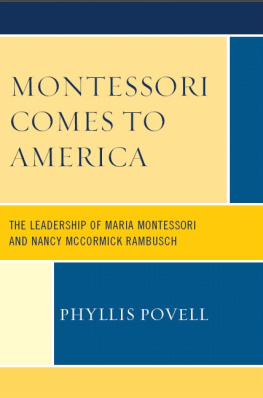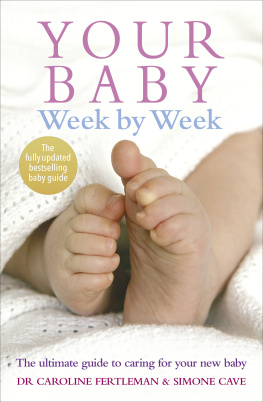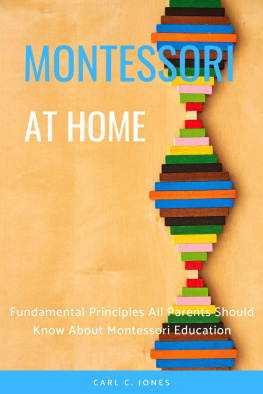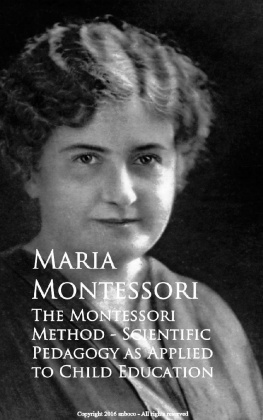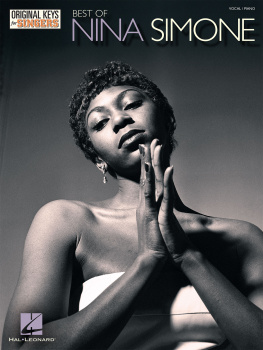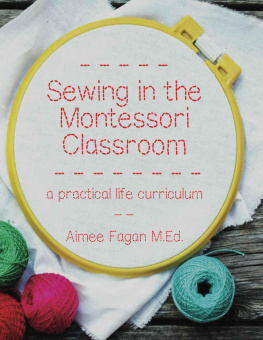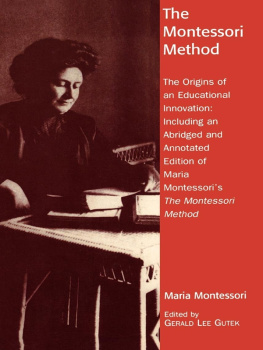Simone Davies - The Montessori Baby
Here you can read online Simone Davies - The Montessori Baby full text of the book (entire story) in english for free. Download pdf and epub, get meaning, cover and reviews about this ebook. year: 2021, publisher: Workman Publishing Company, genre: Home and family. Description of the work, (preface) as well as reviews are available. Best literature library LitArk.com created for fans of good reading and offers a wide selection of genres:
Romance novel
Science fiction
Adventure
Detective
Science
History
Home and family
Prose
Art
Politics
Computer
Non-fiction
Religion
Business
Children
Humor
Choose a favorite category and find really read worthwhile books. Enjoy immersion in the world of imagination, feel the emotions of the characters or learn something new for yourself, make an fascinating discovery.

- Book:The Montessori Baby
- Author:
- Publisher:Workman Publishing Company
- Genre:
- Year:2021
- Rating:3 / 5
- Favourites:Add to favourites
- Your mark:
- 60
- 1
- 2
- 3
- 4
- 5
The Montessori Baby: summary, description and annotation
We offer to read an annotation, description, summary or preface (depends on what the author of the book "The Montessori Baby" wrote himself). If you haven't found the necessary information about the book — write in the comments, we will try to find it.
The Montessori Baby — read online for free the complete book (whole text) full work
Below is the text of the book, divided by pages. System saving the place of the last page read, allows you to conveniently read the book "The Montessori Baby" online for free, without having to search again every time where you left off. Put a bookmark, and you can go to the page where you finished reading at any time.
Font size:
Interval:
Bookmark:
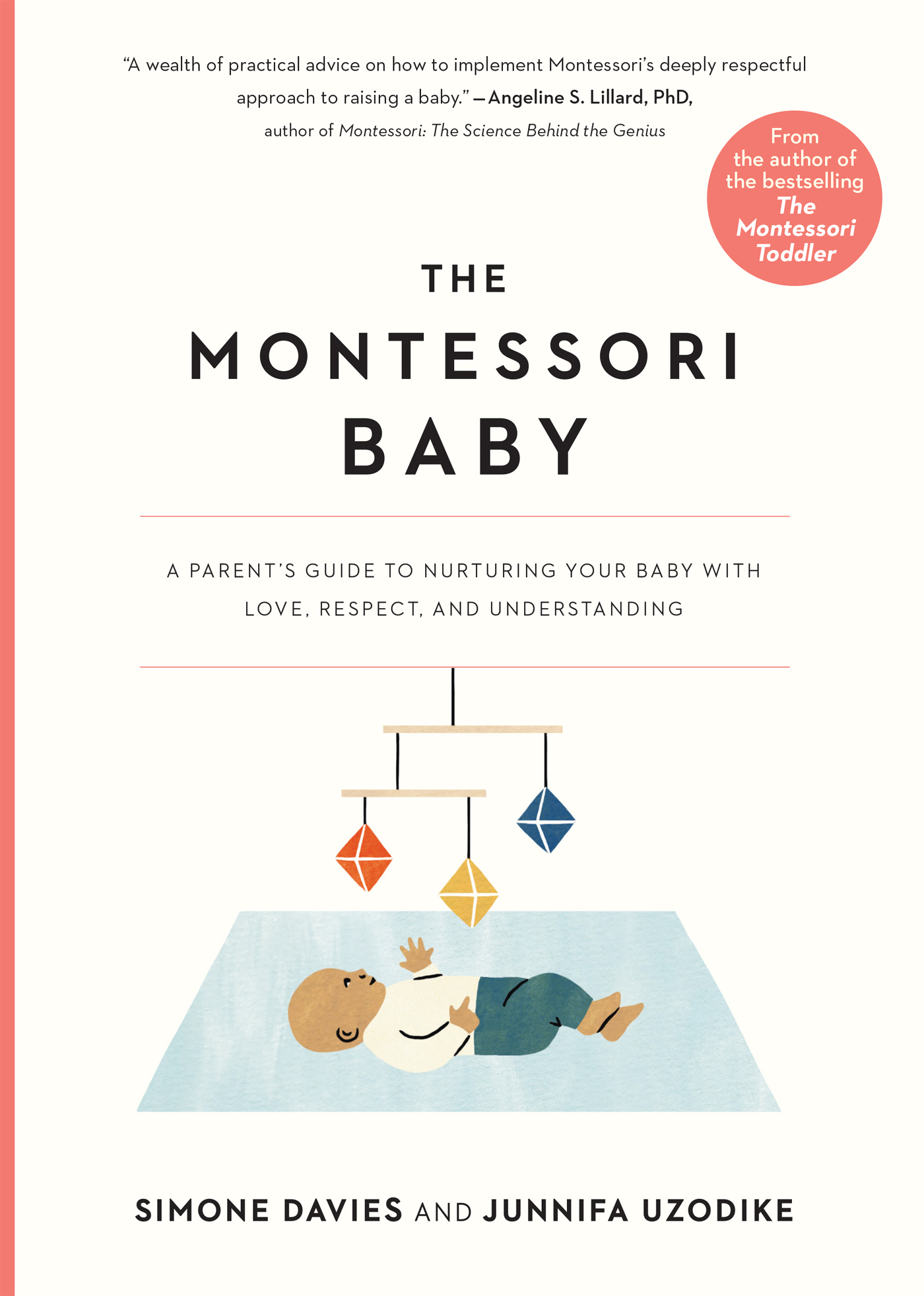
THE MONTESSORI BABY
A Parents Guide to Nurturing Your Baby with Love, respect, and Understanding
Simone Davies and Junnifa Uzodike
WORKMAN PUBLISHING | NEW YORK
To every baby,
may you be guided to develop your unique potential.
You are a gift.
Simone
For Solu, Metu, and Biendu, my Montessori babies:
Thank you for teaching and inspiring me daily.
You are my greatest blessings.
Junnifa
Go to WORKMAN.COM/MONTESSORI for:
Junnifas observations of Solubirth to 15 weeks
Psychomotor development timeline
How to make a topponcino
How to make Montessori mobiles
How to make a patchwork ball
How to make rings on a peg or dowel
How to make rattles
How to make an object permanence box
How to make a ball tracker

Introduction
For a long time, people believed that babies were unable to understand what was going on around them. They thought babies couldnt do much. They just eat and sleep and cry a lot, people would say. Babies were treated as fragile. We were told we needed to wrap them up to protect them.
Then we discovered that babies are in fact learning so much in the early months, and we began to overparent them. We pushed them to learn faster and earlier. We compared our new baby to other babies, afraid that our baby wasnt developing fast enough.
We were told that we needed to buy the best gadgets for our baby: the best educational toys, the best clothing to cover every part of their body, a support for while they sleep, a device to help them sit up sooner, a bed that rocks them to sleep, monitors of every kind, and apps to track everything.
Lets stop.
Lets bring into focus this new life we have brought into the world. Lets look to our baby to see what their unique needs are; what they want to learn; and how we can support them in a more mindful, slower way.
What if we handled babies with respect and learned to ask their permission before handling them?
What if we observed our baby first, rather than rushing to fix things?
What if we saw babies as strong and capable, discovering the world around them like explorers, seeing everything for the first time?
What if we realized that babies are already taking in everything from birth (even from in utero) with all their senses?
What if changing diapers, feeding, and bedtime became moments of connection instead of chores to be rushed through?
What if we slowed down to make time for language and for conversation, even with a newborn baby?
What if we made time for babies to lie on a simple mat to stretch and learn about their bodies?
What if we didnt prop them up into positions that they are not yet ready for, like putting them up to sit or holding their hands to allow them to walk before their muscles are ready?
What if we recognized that a baby has points of referencetheir hands, our voices, the places we feed them, and the rhythm of our daysthat help orient them?
What if we let go of everything we are told we need to buy, and instead provide a simple, beautiful space for our baby?
What if we learned to see that every baby is a unique soul, and that we are here to be their guide on this planet, to support them to grow into the best version of themselves, without pressure from us, and without feeling abandoned?
What if we lie in the woods, on the beach, in the park, and in the mountains, and exposed them to the awe and wonder of nature?
When Simones first baby was born, she remembers feeling deeply moved by the ability to create new life. She did the best she could with the information she had, but all became a lot clearer when she found the Montessori approach when her son was around 18 months old. And, like many parents, she wished she had learned these principles earlier.
With her second baby, Simone applied everything she had learned about Montessori as best she could. Since then she completed her Montessori training (over 15 years ago); her little babies are now young adults, and shes been helping families apply the Montessori principles with their own babies through her parentbaby Montessori classes at Jacaranda Tree Montessori in Amsterdam.
Junnifa was working as a strategy manager for an automotive company in Kentucky, when she serendipitously discovered Montessori. She had accompanied her mother, a teacher, on a visit to a Montessori school and was so moved by what she observed that she decided to take a 6-week introduction to Montessori course to learn more.
Junnifa completed the AMI 03 diploma training one week before the birth of her first child. She implemented what she learned and was amazed by the positive effects it had on her parenting and on her child. She started her blog, nduoma.com , to share her experiences. Hungry for more, she continued to expand her knowledge of child development. She completed the AMI diploma courses for the 36 and 612 age groups as well as the Resources for Infant Educarers (RIE) training.
Junnifa now runs her own Montessori school called Fruitful Orchard Montessori School in Abuja, Nigeria, where she lives with her husband and three young children. Junnifa sits on the executive board for the Association Montessori International (AMI), the organization founded by Dr. Montessori to preserve and propagate her work.
The birth of this book came about effortlessly. Junnifa was visiting Amsterdam from Nigeria for some AMI board meetings and came over to Simones for some home-cooked food. We were just planning to catch up but within an hour we realized we both wanted to write a book about Montessori for babies. By the time Junnifa departed just a few hours later, we had eaten some tasty food and drafted the outline for the book you are holding today.
Every parent and child can benefit from the Montessori approach from the first weeks, the first days, the first hoursand even while our baby is in utero.
Babies are natural learners from birth, not empty vessels to be filled. They are observing everything. They communicate with gurgles and different cries. They never stop moving.
As Dr. Maria Montessori wrote in her book The Absorbent Mind:
[A baby] is by no means passive. While undoubtedly receiving impressions, he is an active seeker in his world. He himself is looking for impressions.
May we all learn from this book how to apply Montessori in our homes from birth, how to respond to our babies cries, how to know which activities they are looking for, how to set up our homesand how to do the work we need to do as parents to raise secure babies who are ready to explore the world around them with confidence and respect for themselves, others, and the Earth.
Its true that babies demand a lot of time, they wake us during the night, they leave us exhausted, and sometimes they cry inconsolably for hours. So why do we love babies?
Babies remind us of how innocent we are when we come into this world. When we see a newborn baby, we cant help but see how every person started life in this way, without any judgment, without any fears, without any baggage. Just as themselves.
Font size:
Interval:
Bookmark:
Similar books «The Montessori Baby»
Look at similar books to The Montessori Baby. We have selected literature similar in name and meaning in the hope of providing readers with more options to find new, interesting, not yet read works.
Discussion, reviews of the book The Montessori Baby and just readers' own opinions. Leave your comments, write what you think about the work, its meaning or the main characters. Specify what exactly you liked and what you didn't like, and why you think so.

